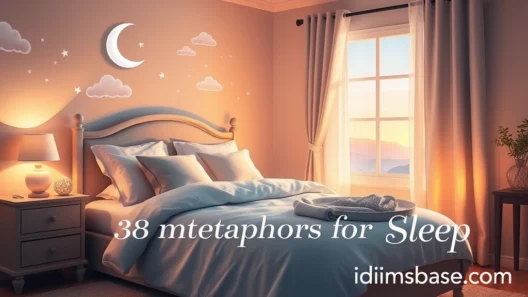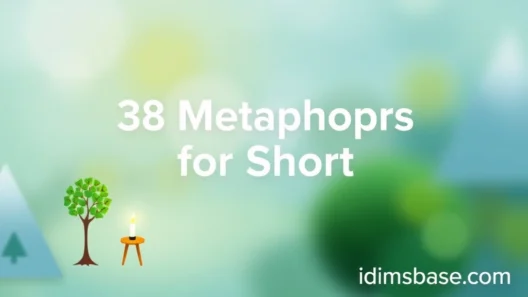Have you ever found yourself searching for the perfect way to describe something incredibly easy, uncomplicated, or straightforward? Sometimes "simple" just doesn't cut it, does it? We're all familiar with that feeling of wanting to add a little flair, a dash of creativity, or a touch of humor when we talk about things that aren't complex.
Well, you're in the right place! We're about to dive into a treasure trove of 38 fantastic metaphors for "simple." Get ready to expand your vocabulary and inject some vivid imagery into your conversations and writing. These aren't just words; they're little linguistic shortcuts that paint a clear picture of effortlessness. Let's explore them together!
Metaphors for Simplicity: A Creative Collection
Here’s a vibrant collection of metaphors that beautifully capture the essence of "simple." Each one offers a unique perspective, allowing you to choose the perfect fit for your context.
Everyday Ease
- A walk in the park: This classic instantly brings to mind something leisurely and enjoyable, with no real obstacles.
- Child's play: Imagine a toddler building blocks; that’s how easy this implies something is.
- Smooth sailing: When everything goes off without a hitch, just like a boat gliding over calm waters.
- A piece of cake: Who doesn't love cake? This metaphor suggests something delightful and effortless to consume.
- Plain as day: No hidden meanings here! It's so obvious, anyone can see it.
- Easy as pie: Similar to "a piece of cake," it conjures images of effortless enjoyment.
- A no-brainer: This one tells you there's no need for deep thought or complex decision-making.
- Like falling off a log: A bit humorous, this evokes an image of something happening without any effort or intention.
- Clear as mud (ironic): While typically meaning confusing, sometimes people use this ironically to mean very clear. Be careful with this one!
- A breeze: Just like a gentle wind that moves things along effortlessly.
Nature's Simplicity
- As clear as crystal: Think of sparkling, pure water; absolutely transparent and easy to understand.
- Like still water: Calm, untroubled, and reflecting everything clearly.
- As natural as breathing: Something so fundamental and automatic, you don't even think about it.
- A gentle slope: No steep climbs or challenging terrain, just an easy path.
- Like a calm sea: No storms, no rough waves, just peaceful and predictable.
- As pure as driven snow: Untainted, unadulterated, and utterly straightforward.
- A clear sky: No clouds, no obstructions, just endless clarity.
- Like a single note: Uncomplicated, singular, and without complex harmonies.
Uncomplicated Constructs
- A straight line: The shortest distance between two points, implying directness and lack of deviation.
- A blank slate: Nothing complex written on it yet, pure and uncomplicated.
- A flat surface: No bumps, no obstacles, just smooth and even.
- A single thread: Not a tangled mess, but one clear, unbroken line.
- A basic building block: The fundamental element, simple in its form and function.
- A skeleton key: One key that opens many doors, suggesting universal ease.
- An open book: No secrets, no hidden depths, everything is visible and easy to read.
- A clean slate: Similar to a blank slate, it implies a fresh start without complications.
Effortless Actions
- Like tying your shoes: A skill learned early, now second nature and requiring no thought.
- As easy as counting to ten: A fundamental skill, universally simple.
- Like pushing a button: An immediate action with a clear, simple outcome.
- Like turning a page: A simple, quick, and effortless action.
- Like breathing in and out: The most basic and continuous action, requiring no conscious effort.
- As simple as A, B, C: The very beginnings of literacy, denoting ultimate simplicity.
- Like flipping a switch: An immediate and uncomplicated change.
- Like unwrapping a gift: The joy is in the opening, which itself is a simple act.
- Like opening a door: A common, straightforward action.
- Like a downhill ride: No pedaling required, just gravity doing the work.
- Like a well-oiled machine: Running smoothly and efficiently, without friction or difficulty.
- Like a pre-set dial: No complex adjustments, just a simple turn.
Why Use Metaphors for "Simple"?
You might be thinking, "Why not just say 'simple'?" And that's a fair question! But using metaphors adds so much more to your communication.

Adding Flavor and Imagery
Metaphors infuse your language with vivid images. Instead of just stating a fact, you're painting a picture in your audience's mind. This makes your message more memorable and engaging. Think about it: "This task is simple" versus "This task is a walk in the park." Which one makes you smile?
Enhancing Understanding
Sometimes, a metaphor can explain a concept more clearly than a direct definition. By comparing something new to something familiar and easy, you bridge the gap in understanding. It's like a mental shortcut!
Boosting Engagement
When your language is creative and expressive, people are more likely to pay attention. Metaphors break up the monotony and keep your audience hooked. They show that you've put thought into your words.
SEO Benefits

Believe it or not, using a variety of descriptive language and metaphors can also subtly help with SEO. It enriches your content, making it more comprehensive and relevant for search engines. When people search for "ways to say easy" or "synonyms for simple," your article, rich with these expressions, becomes a valuable resource.
Frequently Asked Questions About Metaphors for Simple
Here are some common questions you might have about using these fantastic linguistic tools!
Q1: What is the difference between a metaphor and a simile?
A: Great question! Both metaphors and similes are figures of speech used for comparison. The key difference is how they make that comparison:
- Metaphor: States that one thing is another. It creates a direct equivalence. (e.g., "Life is a journey.")
- Simile: Compares two different things using "like" or "as." (e.g., "Life is like a box of chocolates.")
Many of the examples we've shared lean towards metaphorical phrasing, even if some can be easily turned into similes. For instance, "a walk in the park" implies the task is that easy, rather than like a walk in the park.
Q2: How can I choose the best metaphor for my situation?

A: Choosing the perfect metaphor depends on a few things:
- Context: What are you describing? Is it a task, a concept, or a process?
- Audience: Who are you talking to? Will they understand the reference? "Child's play" is universally understood, but some metaphors might be more niche.
- Tone: Do you want to be funny, serious, encouraging, or dismissive? "A piece of cake" is lighthearted, while "a well-oiled machine" sounds more professional.
- Impact: What feeling or image do you want to evoke?
Try saying a few options out loud and see which one feels right and conveys your message most effectively.
Q3: Can I create my own metaphors?
A: Absolutely, and we encourage it! The best metaphors are often original and fresh. To create your own, think about:
- The concept you want to describe: "Simple."
- Something completely different that shares a quality with "simple": What else is effortless, clear, or uncomplicated? Maybe a flowing river, an empty room, or a single drop of water.
- Connect them: "The solution was a flowing river of clarity," or "Their plan was an empty room – nothing complicated inside."
Practice makes perfect, and the more you play with language, the more creative you'll become!
Q4: Are there any metaphors for "simple" that I should avoid?
A: While most metaphors are generally safe, it's always good to be mindful of:
- Overused clichés: While included in our list for completeness, phrases like "easy as pie" or "a piece of cake" can sometimes feel a bit tired if used too often. Mix them up with fresher options!
- Culturally specific references: Ensure your metaphor is understood by your global audience. Something that's "simple" in one culture might not translate the same way elsewhere.
- Offensive or insensitive comparisons: Always double-check that your metaphor doesn't unintentionally cause offense or belittle a situation.
Q5: How do metaphors improve writing and speaking?
A: Metaphors are powerful tools for several reasons:
- Vividness: They make your language more colorful and exciting.
- Memorability: People are more likely to remember a striking image than a plain statement.
- Persuasion: They can make your arguments more compelling by creating strong associations.
- Conciseness: Sometimes, a metaphor can convey a complex idea in just a few words.
- Engagement: They keep your audience interested and entertained.
Key Takeaways
We've explored a wonderful world of ways to say "simple" without actually saying it! Here are the main points to remember:
- Beyond "Simple": There are countless creative ways to describe ease and lack of complexity.
- Enhance Communication: Metaphors add imagery, clarity, and engagement to your writing and speaking.
- Variety is Key: Choose the metaphor that best fits your context, audience, and desired tone.
- Practice Makes Perfect: Don't be afraid to experiment with these phrases or even create your own!
- Boost Engagement: Using vivid language keeps your audience hooked and makes your content more memorable.
So, the next time you need to describe something as effortless or straightforward, skip the mundane and reach for one of these vibrant metaphors. Your audience will thank you for the delightful linguistic journey! Which one is your favorite? Share your thoughts and let us know how you plan to use these fantastic phrases!






